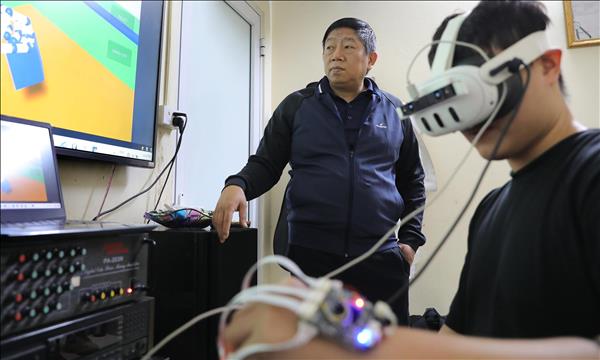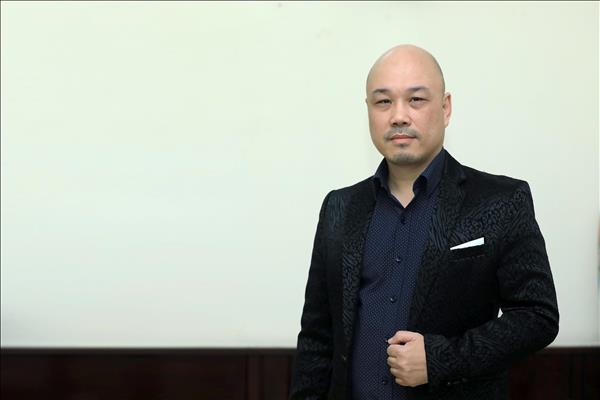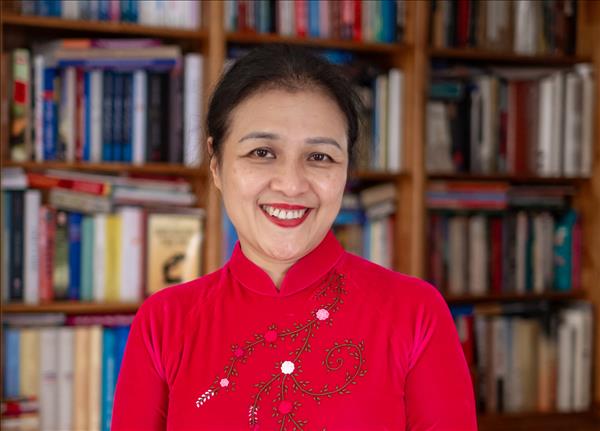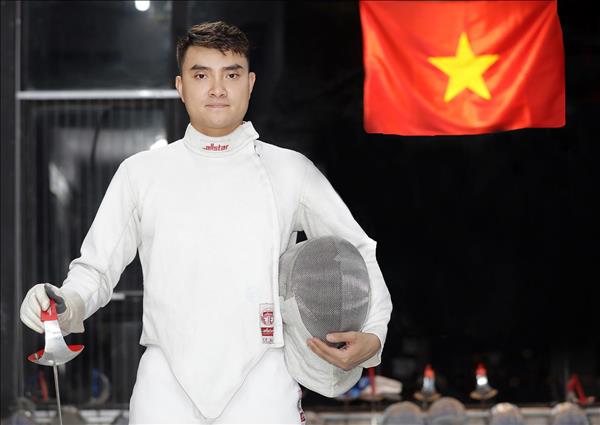11 years ago, Vietnam Pictorial did an article about Mrs. Vo Thi Thang who is famous for “Triumphant Smile” which was deeply imprinted in the memory of the times. On August 22, she passed away at the age of 69. To honour her, Vietnam Pictorial would like to introduce to readers the article printed on Vietnam Pictorial No.3, 2003.
Mrs.Vo Thi Thang (in 2003). Photo: VNP's file
How could a young girl just over 20, sentenced to 20 years’ hard labour, have such a gentle and innocent smile of self-confidence! That’s why, some wonder whether or not Vo Thi Thang was real; her smile had become virtually surreal. However, to those who know the land and the people living on this soil, this is quite simple and understandable. That smile belongs to Mother – the Vietnamese Motherland.
Those who come to communicate with Mrs.VoThiThang, even for the first time, will have a feeling of being near a dear friend, for her gentle, unassuming and elegant character, whose smile turned into the epitome of victory of the Vietnamese nation in its anti-US struggle.
- Now that your face is wreathed in smiles, you seem to have no worries at all.
+ As human beings, all people have their own joys or sorrows.
- What are they?
+ They are the moments when you are not satisfied with results of your work and when people fail to understand you. Sometimes you are sad about yourself; sometimes you feel saddened about others.
- What do you usually do then?
+ I read books and find more work to do. I play with my children, or just sleep. Then I can regain peace of my mind
- Looking at the photo of you taken by the Japanese journalist at the court trial roughly 35 years ago, those who love you call it “Triumphant smile” What do you think about it?
+ Yes, they have given the photo such a name. But my smile would have meant nothing without an undaunted and indomitable nation behind me.
Those who come to communicate with Mrs.VoThiThang, even for the first time, will have a feeling of being near a dear friend, for her gentle, unassuming and elegant character, whose smile turned into the epitome of victory of the Vietnamese nation in its anti-US struggle.
- Now that your face is wreathed in smiles, you seem to have no worries at all.
+ As human beings, all people have their own joys or sorrows.
- What are they?
+ They are the moments when you are not satisfied with results of your work and when people fail to understand you. Sometimes you are sad about yourself; sometimes you feel saddened about others.
- What do you usually do then?
+ I read books and find more work to do. I play with my children, or just sleep. Then I can regain peace of my mind
- Looking at the photo of you taken by the Japanese journalist at the court trial roughly 35 years ago, those who love you call it “Triumphant smile” What do you think about it?
+ Yes, they have given the photo such a name. But my smile would have meant nothing without an undaunted and indomitable nation behind me.
FALLING INTO THE HANDS OF THE ENEMY
|
“Triumphant Smile” How could a young girl just over 20, sentenced to 20 years’ hard labour, have such a gentle and innocent smile of self-confidence! That’s why, some wonder whether or not Vo Thi Thang was real that her smile had become virtually so surrealistic. However, to those who know the land and the people living on this soil, this is quite simple and understandable. That smile belongs to Mother – the Vietnamese Motherland. »
|
During the days of the 1968 Mau Than General Offensive, all of South Vietnam, its towns and cities, Saigon and Cho Lon were awakened by the artillery and cannons of the liberation army. This caused the working people and the intellectuals, the students and the school children to rise up to fight the enemy. Also in late July and early August 1968, Saigon was shocked by VothiThang’s attempt to kill wicked thugs, but she was caught at that very brief moment, while hesitating for the sake of peace of mind to ensure they were the right targets before firing the first shot.
- In the ultimate analysis, it was because of your compassion that you were caught. Did you repent afterward?
+ No. There is nothing to repent for. I carried out the mission entrusted to me by the people and the Fatherland. I could not afford to kill an innocent man. It is the nature of the revolution to win back national independence and bring happiness to everyone. We only got rid of those who came with the intent to invade our country and those who purposefully betrayed the nation.
- In the ultimate analysis, it was because of your compassion that you were caught. Did you repent afterward?
+ No. There is nothing to repent for. I carried out the mission entrusted to me by the people and the Fatherland. I could not afford to kill an innocent man. It is the nature of the revolution to win back national independence and bring happiness to everyone. We only got rid of those who came with the intent to invade our country and those who purposefully betrayed the nation.
A COURT TRIAL AND THE VERDICT OF 20 YEARS’ HARD LABOUR
On August 2, 1968, the Saigon press was in an uproar about the trial of this charming young Vietnamese Communist ranger.
Her first thought was how dignified she should behave in the court, both in her attitude and her dress. She liked black, the colour typical of her homeland and the revolutionary combatants that she loved so much. On that morning, before going to court, she borrowed a black blouse from a fellow political prisoner, put it on and then went to the van. Through the small glass pane, she could scarcely see the paddy fields with ripe rice plants, the hamlets with thatched roofs and the lines of dark green coconuts palms. That peaceful, quiet and calm morning, suddenly evoked in her a profound nostalgia for the countryside and her parents, co-villagers and comrades-in-arms.
The van came to a grinding halt. She got out between two rows of military police armed to the teeth. She lightly nodded her head, saluting the people on both sides.
Here is the dialogue at the trial:
- Was it you who tried to shoot Mr.Tran Van Do?
+ Yes.
- Why? Because of personal feud?
+ No. He and I had no personal feud. I tried to kill him because he was the common enemy of the nation.
- Think it over.
+ No. I have thought hard since I joined the revolution.
The trial halted after 15 minutes for deliberation, then the judge sentenced Vo ThiThang to 20 years’ hard labour. She smiled saying: “Can your administration last 20 years to imprison me?” that was her statement after the verdict.
Returning to the detention camp, Thang fell into the embrace of the inmates, her tears ploughing furrows on her cheeks. She cried in the embrace of the love of her inmates. Six years later, she was released in a swap of prisoners after the Paris Agreement. Arriving in the liberated zones, she thought: “After getting lost somewhere, I am now coming back to momma.” Six years in prison was a great time to forge, analyse and test the will, dauntlessness and strength of this revolutionary combatant.
The image of Mrs. Vo Thi Thang on the front cover of Vietnam Pictorial No.3, 2003. Photo: Vietnam Pictorial's file
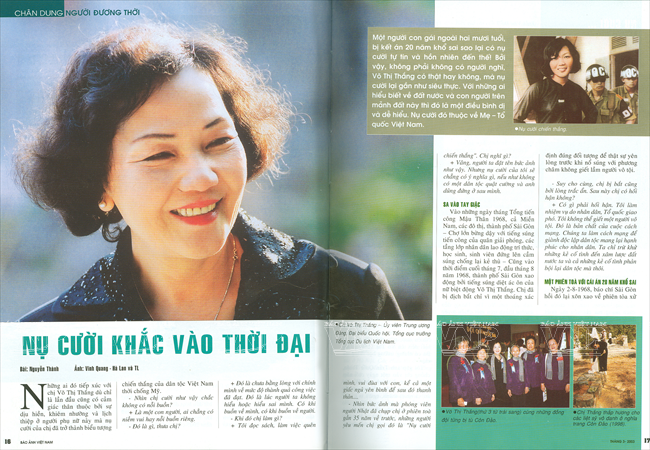
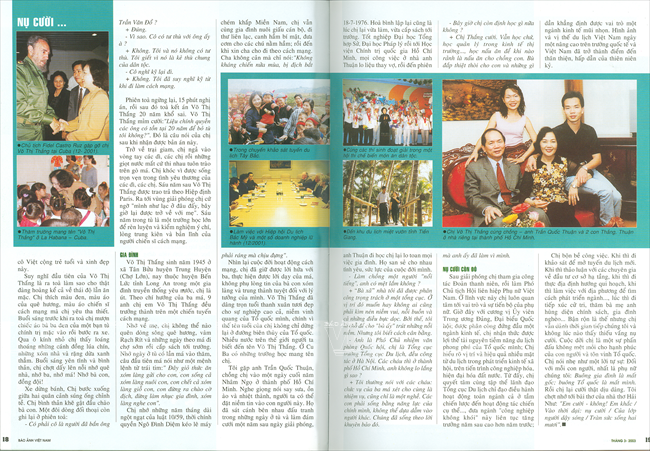
The article about Mrs. Vo Thi Thang with lively images printed on Vietnam Pictorial Issue No.3, 2003.
HER FAMILY
Vo Thi Thang was born in 1945 in Tan Buu Village, TrungHuyen District (Cho Lon), now Ben Luc District of Long An Province, into a farmer’s family rich in patriotism. She was the youngest in the family. Following the path of her father and mother, her nine brothers and sisters grew up with the same battle line of the revolution.
Recalling memories of her mother, she could not help feeling reminiscent of the river running through her native land, the RachRit, and the days she followed her mother to the morning market then went to school. During her days in jail, her mother often made prison visits, and her first words sounded like a mandate of her heart: “This is a basket of food the villagers have given to you. The entire village wants to feed you so that you may go on living, and if you die, the entire village will celebrate your death anniversary. So never salute the enemy’s flag, never humiliate the honour of the family or the village!
Thang recalled the long years of Law 10/59, under the Ngo Dinh Diem administration that dragged its guillotines to all corners of the South, when she and her family hid and protected revolutionary combatants, working as their liaison-girl, guarding their underground shelter, and bringing them food and drink. When she asked her father to allow her to join the revolutionary movement, he did not dissuade her, but said: “You should not go half way, and if you’re caught by the enemy, try to stand up to them.”
Now looking back upon her work for the revolution, she has kept her pledges to her father and practised her mother’s teachings, lived up to the trust and confidence in her by the villagers and full allegiance to her ideals. She wholeheartedly dedicated her green years and the prime of her life to the noble cause and the glory of her Fatherland. For this, her fame and reputation has not stopped at the boundaries of her country, but gone beyond them to other lands in the world as well. In Cuba, quite a few schools bear her name.
I met Tran Quoc Thuan, her husband, on a day late in the year of Nham Ngo (2002) in Ho Chi Minh City. Listening to his passionate, energetic and zealous speech, you gained complete confidence in this gentleman. The couple was shoulder to shoulder waging their struggle in prison, and married one year after the liberation of the city, on July 18, 1976. The return of peace was the period when she both worked and went to school. During her days at the Department of History of the National University, the Law School and Ho Chi Minh National Institute of Politics, her husband took care of the housework in her stead, and when it was his turn to go to school, she did all the work at home for him. They have shared their love and their energy together.
- As the husband of a “well-known” lady, how do you feel?
+ My better half has been assigned a heavy mission. Like it or not, in such a position, people ought to restrain their joys and sorrows, and even sometimes their anger. For this reason, I am the one for “her” to vent all her troubles on. But I know how to keep balanced.
- You’re Deputy Chairman of the Office of the National Assembly, and she is Director General of the National Administration of Tourism, and you are both working in Hanoi, but your children live in Ho Chi Minh City, and you don’t worry about them?
+ I often tell them: our work, after all, is also our task, a profession. You should live on your own, without dependence on others, and they have lived up to that.
- (to Mrs. Thang) Do you intend to study further?
+ (Thang smiling) I keep learning, studying management in a market economy, culinary art to cook good food for my children and husband, in return for what he has done for me.
THE SMILE IS STILL THERE
After the liberation, she joined in the work of the Youth Union, as Deputy Chairwoman of the Vietnam’s Women Union. In this respect, she always paid attention to the advancement of women. Now, in the capacity of a member of the Party Central Committee and National Assembly Deputy, working as the leader of an economic sector, she has become well aware of the rich tourism potential of the country. She has come to clearly realize the all-around role and efficiency of tourism in socio-economic development, in national industrialization and modernization. She has resolved, together with the leadership of the National Administration of Tourism, to guide and direct the operation of the sector, both at macro and micro levels, thus bringing “the smokeless industry” to constant year-after-year growth, and gradually asserting the role of this key economic sector. As a result, the image and status of Vietnamese tourism have been improved to a large extent in the international arena, and Vietnam has become a friendly alluring destination of the new millennium.
She is often hard at work, embarking on surveying journeys to open new tourism routes, engaging in discussions with experts on investment in infrastructure, conducting fieldwork for planning, working with constituents, paying visits to the heroine mothers of under privileged families. She was so busy, yet she still found time to receive us, always with a smile on her face. Her life is one of tireless endeavours for the happiness of all people and the glory of the Fatherland. She gently told us, as a way of relating about herself. “To each person, particularly us women, leaving their family, they are likely to lose their roots; leaving their Fatherland, they are likely to lose their self.” Then she smiled so gently again. All of a sudden, I recalled the poem of Hai Nhu:
You smile? – No! You are imprinted in the memory of the times: the smiles of the generation rising up, with full vitality at the age twenty!
| - Mrs. Vo Thi Thang was born on January 10, 1945 in Tan Buu Commune, Ben Luc District, Long An Province. She held positions as a member of the Party Central Committee for the 9th and 10 tenures, National Assembly deputy for the 9th, 10th and 11th tenures; General Director of the Vietnam National Administration of Tourism, Chairwoman of the Vietnam-Cuba Friendship Association and Chairwoman of the Vietnam Women’s Association. She was awarded the Order of Independence, second class; the Order of Labour, first class; the Order of American War in Vietnam and National Salvation, first class; the Cuba Friendship Order; Medals of ANA BETANCOUR CUBA and ORIENTE CUBA and a badge marking her 40-year Party membership |
Story: Nguyen Thanh - Photos: Vinh Quang, Ha Lan & Files
danghuyen

